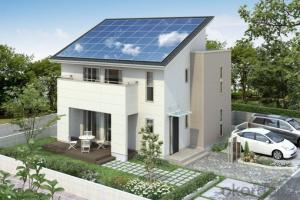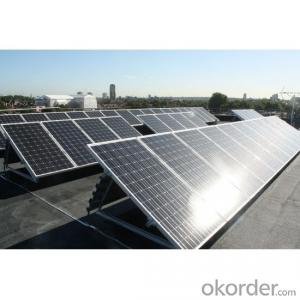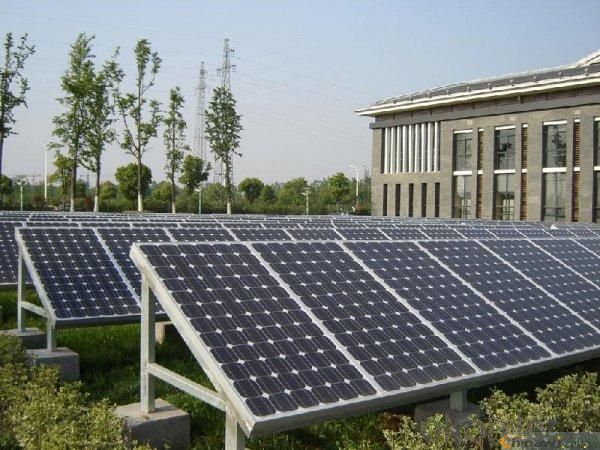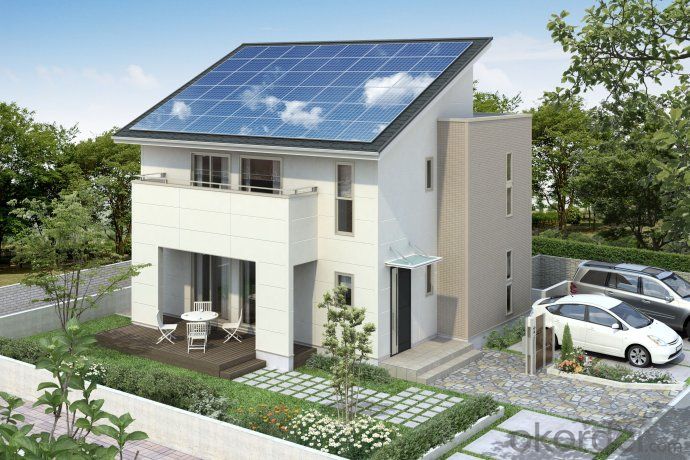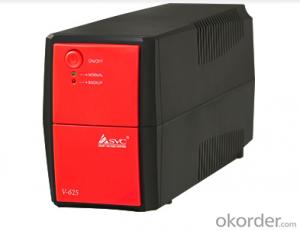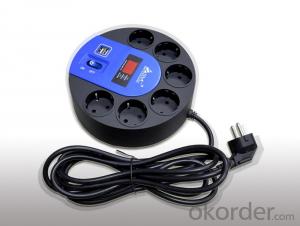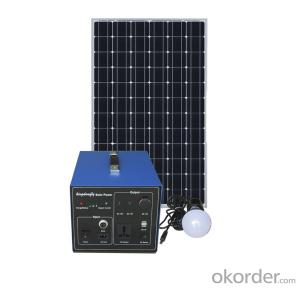Kyrocera Roof and Ground Solar System 2024 New Model
- Loading Port:
- Shanghai
- Payment Terms:
- TT or LC
- Min Order Qty:
- 3000 watt
- Supply Capability:
- 2000000 watt/month
OKorder Service Pledge
OKorder Financial Service
You Might Also Like
Specification
It can load household appliances like TV, Air Conditioner, refrigerator, lighting, washing machine, etc.It can be applied to the villa, household, tourist resorts, prairie areas, remote mountain village, no power supply areas, farms, villages, island, highway and any regions to generate electricity.
Features--- Solar Generator System for Home
1.100% photovoltaic storage system, domestic power supply.
2.New green energy applicable to household appliances, TV and phone charging, etc.
3.Equipped with various safety devices.
Remark: The sunshine rediation will affect the charge time, so we will supply you perfect design according to your local climate.
| Packaging & Delivery | |
| Packaging Detail: | using carton or wooden box as per customer's requirement. |
| Delivery Detail: | within 10~30 days for shipment depending on order quantity |
Excellent battery backup 300W to 10KW off grid solar system with grid power switch
Anern Advantage:
1) Over 10 year experience in clean energy line, business covering solar street light, solar garden light, off grid
solar system and on grid solar power system, etc;
2) Exporting for worldwide, with satisfied clients more than 50 countries;
3) Competitive price, excellent service, integrated certificate system;
Solar system advantages:
1. CE, ROHS approved.
2. High conversion efficiency, high-transmission rate.
3. Energy saving, environmental-friendly.
4. Advanced technology, strict quality control system.
5. Easy installation, safe operation, free maintenance.
6. Low MOQ, fast delivery time, long service life
| Specifications: | ||
| Ref No. | OFF-SGHP-3KW | |
| System Basic Information | Solar Panel Rated Output Power | 3KW |
| Suitable for Max Daily Power Consumption | 10KWH | |
| Rated Output AC Capacity | 3KW | |
| Solar panel | ||
| Type | Crystalline Silicon PV Module, A-class | 12pcs |
| Max Power | 250W | |
| Vmp | 30.5V | |
| Size | 1655*992*45mm | |
| Weight | 22.5kg/pc | |
| 25 years power output guarantee (Note: 2pcs panels connect in series) | ||
| Controller | ||
| Voltage | 48V | 1pc |
| Current | 60A | |
| Warranty | 1 year | |
| PWM high-efficiency charging controller, LED display, intelligent control; Temperature compensation, various protections. | ||
| Circuit Breaker | Used for protection of controller, installed between PV array combiner and controller | 1pc |
| Inverter | ||
| Input Voltage | DC48V | 1set |
| Output Voltage | AC220V/110V 1-phase | |
| Frequency | 50/60Hz | |
| Efficiency | 90% | |
| Note: This inverter provides grid power switch and battery charging functions. | ||
| Battery | ||
| Capacities | 12V/200AH per piece | 8pcs |
| Service life | 5 to 6 years | |
| Warranty | 3 years | |
| Solar panel rack | Flat-roof type mounting rack, steel material, anti-rust treatment | 1 set |
| (Other types of racks can be customized as per client's requirement) | ||
| Cable | 50m | |
| Connectors | 3-terminal connectors, used for panels connection in parallel | 6 set |
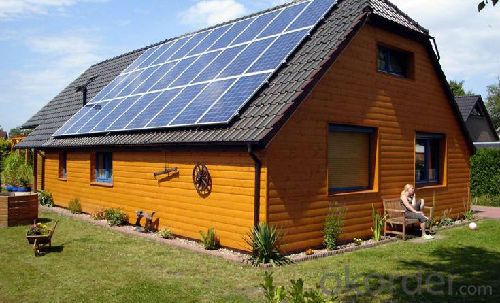
Product features:
1. Off grid solar power system is mainly used for application with relatively-small power consumption, and the areas have no grid network coverage, or grid power is unstable or outage condition.
2. It’s composed of solar panels, hybrid solar inverter, battery bank, solar panel mounting racks, and other accessories required fora complete home solar power system.
3. The battery bank gives a stable power output to the solar inverter which converts DC to AC to power loads, and provides power backup in rainy or cloudy days.
4. The solar panels generate electricity at daytime and charge the battery bank .
5. The off grid home solar power system provides grid power bypass in case of battery power shortage when sunshine is not enough.
6. All the off grid home solar power system configurations are worked out by scientific calculation and design.
FAQ
We have organized several common questions for our clients,may help you sincerely:
①what price for each watt?
it depends on the quantity, delivery date and payment terms,
②what is your size for each module? can you tell me the parameter of your module?
we have different series of panels in different output, both c-si and a-si. please take the specification sheet for your reference.
③Can you provide the peripheral products of the solar panels, such as the battery, controller, and inverter? If so, can you tell me how do they match each other?
Yes, we can, we have two companies for solar region, one is CNBM International, the other is CNBM engineering Co.
We can provide you not only the solar module but also Solar Cells, the off grid solar system, we can also provide you service with on grid plant.
④What is your warranty system?
Our product performance guarantees for 25 years
• 12 years guarantee for workmanship
• Timeliness of delivery
• Quality Products certified (TÜV, UL, CE, ISO)
⑤How do you pack your products?
We have rich experience on how to pack the panels to make sure the safety on shipment when it arrives at the destination.
⑥ Can you do OEM for us?
Yes, we can.
⑦How long can we receive the product after purchase?
In the purchase of product within three working days, We will arrange the factory delivery as soon as possible. The pecific time of receiving is related to the state and position of customers. Commonly 7 to 10 working days can be served.
- Q: Are there any risks of electrical malfunctions or failures during extreme weather events with solar energy systems?
- Solar energy systems may encounter risks of electrical malfunctions or failures during extreme weather events. While solar panels are designed to withstand various weather conditions, such as rain, snow, and wind, they remain susceptible to damage in severe weather events like hurricanes, tornadoes, or severe storms. In extreme weather, high winds have the potential to physically harm solar panels by dislodging them from their mounts or causing them to break. Heavy snowfall can also cover the panels, reducing their efficiency and potentially causing them to collapse due to the weight. Additionally, lightning strikes during thunderstorms can jeopardize the electrical components of the solar energy system, leading to potential malfunctions or failures. Nevertheless, it is important to note that solar energy systems are typically equipped with safety measures to minimize these risks. Many solar panels undergo testing and certification to ensure they can withstand specific wind speeds and snow loads. Sturdy and secure mounting systems are utilized, and electrical components often have surge protection to safeguard against lightning strikes. Furthermore, solar energy systems are interconnected with the power grid, enabling a seamless transition to grid power during extreme weather events if needed. This helps mitigate the impact of potential malfunctions or failures. To mitigate the risks associated with extreme weather events, regular maintenance and inspection of solar energy systems are crucial. Periodic check-ups and cleaning can ensure the panels are in good condition, and any signs of damage or wear can be promptly addressed. It is also advisable to seek guidance from a professional installer or technician who can offer advice on specific weather-related risks and potential solutions.
- Q: What is the role of solar energy systems in reducing noise pollution?
- Solar energy systems can play a significant role in reducing noise pollution as they operate silently, unlike conventional power generation methods such as fossil fuel-based power plants or generators. Since solar panels do not have any moving parts, they produce electricity without creating any sound, thereby helping to minimize noise pollution in urban and residential areas.
- Q: Can solar energy systems be used in areas with high altitude?
- Yes, solar energy systems can be used in areas with high altitude. In fact, solar panels can be even more effective in such areas due to the increased solar irradiance at higher altitudes. However, it is important to consider factors like temperature, snowfall, and extreme weather conditions that may affect the performance and maintenance of solar energy systems in high altitude areas.
- Q: Can solar energy systems be integrated with battery storage?
- Yes, solar energy systems can be integrated with battery storage. Battery storage allows excess solar energy generated during the day to be stored for use during times when the sun is not shining, such as at night or during cloudy weather. This integration enhances the reliability and efficiency of solar energy systems by providing a continuous and reliable source of electricity.
- Q: Can solar energy systems be integrated into building design?
- Yes, solar energy systems can definitely be integrated into building design. In fact, solar panels and other solar technologies are commonly incorporated into the design and construction of modern buildings. This integration allows for the generation of clean and renewable energy on-site and reduces dependence on traditional energy sources. Additionally, integrating solar energy systems into building design can help reduce greenhouse gas emissions and contribute to a more sustainable and environmentally friendly future.
- Q: How does the efficiency of solar panels vary across different angles of sunlight?
- The efficiency of solar panels can vary across different angles of sunlight due to several factors. One factor is the incident angle of sunlight. Solar panels are most efficient when sunlight strikes them perpendicular to their surface. As the angle of sunlight becomes more oblique, the energy output of the panels decreases. This is because when sunlight strikes the panel at an angle, it has to travel a longer distance through the material, resulting in more absorption and reflection, and less energy conversion. Another factor is the tracking system of solar panels. Some solar panels have tracking systems that allow them to follow the sun's movement throughout the day, optimizing the angle of incidence. These tracking systems can significantly increase the efficiency of solar panels, as they ensure that the panels are always aligned with the sunlight, maximizing the energy output. Furthermore, the efficiency of solar panels can also be affected by the type of solar cell technology used. Different types of solar cells have varying sensitivities to the incident angle of sunlight. For example, monocrystalline silicon solar cells tend to have higher efficiencies at steeper angles of sunlight compared to polycrystalline or thin-film solar cells. In summary, the efficiency of solar panels can vary across different angles of sunlight due to factors such as incident angle, tracking systems, and the type of solar cell technology used. Optimizing the angle of incidence and implementing tracking systems can help maximize the efficiency of solar panels and increase their energy output.
- Q: Can solar energy systems be used to power an entire home?
- Yes, solar energy systems can be used to power an entire home. With advancements in technology, solar panels can generate enough electricity to meet the energy demands of a household. Additionally, energy storage solutions like batteries can be used to store excess energy generated during the day for use at night. This allows homeowners to rely on solar power even when the sun is not shining.
- Q: How do solar energy systems affect the roof's lifespan?
- Solar energy systems can actually extend the lifespan of a roof. The panels provide an additional layer of protection to the roof, shielding it from harmful elements like UV rays and extreme weather conditions. Additionally, the panels help to regulate the temperature of the roof, reducing thermal stress and preventing premature aging.
- Q: Can solar energy systems be used in areas with limited access to solar batteries?
- Yes, solar energy systems can still be used in areas with limited access to solar batteries. In such cases, the solar energy generated during the day can be directly consumed or stored temporarily in alternative energy storage systems like capacitors or flywheels. These systems can be used to power devices or provide electricity during periods of low or no sunlight, ensuring a continuous and reliable energy supply even without solar batteries.
- Q: How do solar energy systems contribute to reducing reliance on fossil fuels?
- Solar energy systems contribute to reducing reliance on fossil fuels by harnessing energy from the sun, which is a renewable and abundant source of power. Unlike fossil fuels, solar energy does not produce harmful greenhouse gas emissions or contribute to air pollution. By utilizing solar energy systems, we can decrease our dependence on non-renewable fossil fuels, mitigate climate change, and create a more sustainable and eco-friendly energy future.
Send your message to us
Kyrocera Roof and Ground Solar System 2024 New Model
- Loading Port:
- Shanghai
- Payment Terms:
- TT or LC
- Min Order Qty:
- 3000 watt
- Supply Capability:
- 2000000 watt/month
OKorder Service Pledge
OKorder Financial Service
Similar products
Hot products
Hot Searches
Related keywords

